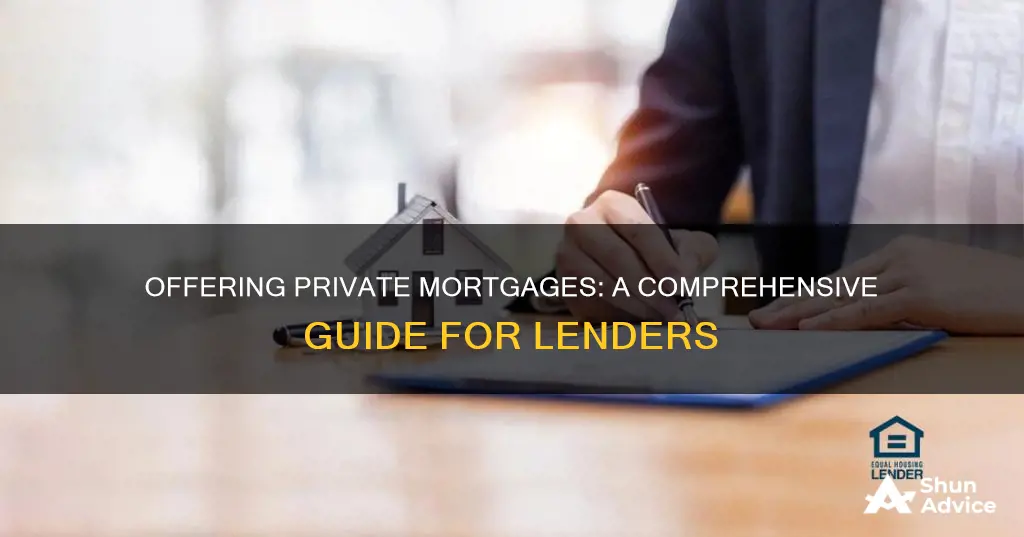
A private mortgage is a loan provided by a person or company that creates their own rules, guidelines, and qualification requirements, which could be different for each borrower. This makes the loan riskier for both parties involved. Private mortgages are often provided by a family member, friend, or business. They are usually short-term, interest-only loans designed for borrowers who can't use a traditional mortgage for various reasons, such as poor credit history or non-traditional sources of income. Private lenders are more likely to see the mortgage as an investment and are therefore less strict regarding credit history and background checks. If you are considering providing a private mortgage, it is important to weigh the pros and cons and consult a financial professional or real estate attorney before lending out money.
| Characteristics | Values |
|---|---|
| Type of mortgage loan | Private mortgage |
| Source of funds | Another person or business |
| Lender | Family, friends, or others with personal relationships to the borrower |
| Borrower | Individuals or companies |
| Requirements | Proof of income, down payment, sellable property |
| Interest rate | Potentially higher |
| Security | Less security for the borrower |
| Application process | Faster and easier |
| Eligibility | Easier eligibility |
| Repayment terms | Shorter repayment terms |
| Loan term negotiation | Possible |
| Documentation | Important for protecting both parties |
What You'll Learn
- Private mortgages are faster and easier to obtain than traditional mortgages
- Private mortgages are provided by individuals or companies, not banks
- Private mortgages have higher interest rates and fees
- Private mortgages are riskier for both the borrower and the lender
- Private mortgages are suitable for those with poor credit history or non-traditional sources of income

Private mortgages are faster and easier to obtain than traditional mortgages
Private mortgages are often sought by individuals who are unable to meet traditional lending standards. This could include those with a poor credit history, irregular income, or those who are self-employed. The private mortgage industry is less regulated, which means that loan conditions can vary from lender to lender. Some private lenders may be more restrictive and punitive, while others may be more flexible and willing to negotiate terms. It is important to note that private mortgages often come with higher interest rates and additional fees to offset the risk taken by the lender.
The approval process for a private mortgage can be faster and easier than that of a traditional mortgage. Private lenders may have more flexible eligibility requirements and may be more willing to work with borrowers who have unique financial situations. They may also be more open to negotiating repayment terms, interest rates, and fees. However, it is important to remember that private mortgages are not subject to the same borrower protections as traditional mortgages, and there may be limited consumer protections in place.
Private mortgages are typically provided by individuals or companies that are not traditional mortgage lenders, such as family members, friends, or private investors. These lenders often create their own guidelines and terms for the loans, which can make it easier for borrowers to qualify. However, it is important to carefully consider the risks and benefits of a private mortgage before proceeding. Consulting with a financial professional or real estate attorney is recommended to ensure that all parties involved understand the terms and potential risks associated with the loan.
Paying Off Your Mortgage Faster: Strategies for Success
You may want to see also

Private mortgages are provided by individuals or companies, not banks
A private mortgage is a loan between individuals or companies, instead of using banks. Private mortgages are issued by private lenders, who are often family, friends, or others with personal relationships with the borrower. Private mortgages are usually sought by borrowers who cannot qualify for a traditional mortgage due to poor credit history or non-traditional sources of income. Private lenders are more likely to see the mortgage as an investment and are, therefore, more flexible with credit history and background checks.
Private mortgages have a faster approval process and are more flexible in their terms, such as the home price, repayment terms, interest rate, and fees. They also have easier eligibility requirements, although these may differ for each borrower. For example, proof of income and a minimum down payment of 15% of the purchase price are usually required.
However, there are some risks associated with private mortgages. They tend to have higher interest rates, additional fees for setup and commissions, and interest-only payments. The loan is also riskier for both the borrower and the lender, as private lenders are not licensed and do not have the same borrower protections as traditional mortgages. Introducing debt into a personal relationship can also be tricky, as the borrower may feel extra stress and guilt if they are unable to make payments.
Before agreeing to a private mortgage, it is important to consult a professional, such as an attorney or financial advisor, to ensure that all parties involved understand the terms and potential risks. It is also crucial to have clear and detailed documentation to protect both the borrower and the lender.
Protecting Your Documents When Applying for a Mortgage
You may want to see also

Private mortgages have higher interest rates and fees
Private mortgages are issued by private or individual lenders, often a family member or friend, and not a traditional lender like a bank or financial institution. The private lender sets their own guidelines, qualification requirements and repayment terms, which could differ for each borrower. This flexibility means that a borrower who might not be approved for a traditional mortgage may be approved for a private one.
However, the interest rates and fees tend to be higher for private mortgages. This is because private mortgages are riskier for both the lender and the borrower. The lenders assume more risk by offering a mortgage to a borrower who might not qualify for a traditional mortgage. To compensate for this risk, the interest rates are higher. The interest rates are determined by the lender, who evaluates the risk versus reward. The higher the risk, the higher the interest rate will be.
Additionally, private mortgages have fewer regulations and consumer protections in place. This means that the borrower may be approved for a loan that they are unable to repay, which puts them at a higher risk of foreclosure. The lack of regulations also means that there is less security and more potential for hidden fees.
It is important for borrowers to carefully consider their options and consult a financial professional before applying for a private mortgage. The flexibility and ease of approval of private mortgages come at the cost of higher interest rates and fees, which can lead to more expensive debt.
Making Mortgage Payments: Wells Fargo Guide
You may want to see also

Private mortgages are riskier for both the borrower and the lender
Private mortgages are issued by a private, individual lender or company, rather than a traditional lender like a bank or mortgage broker. The loan works like a regular mortgage, in that the borrower must pay back the loan, plus interest, within an agreed-upon timeframe. However, private mortgages are riskier for both the borrower and the lender.
Firstly, private mortgages are riskier for the borrower. Private lenders are not subject to the same federal regulations and lending standards as traditional lenders, and there are fewer borrower protections in place. For example, traditional mortgages have set guidelines, such as the stress test, that protect the borrower. Private lenders are not legally obligated to impose these same standards, which means that borrowers may find themselves in a risky loan agreement that they cannot afford. Private lenders can also be quicker to foreclose on a home if the borrower falls behind on payments. Private mortgages may also come with higher interest rates, additional costs, and shorter repayment terms, which can increase the borrower's debt load.
Secondly, private mortgages are riskier for the lender. Private lenders often base the loan approval on the value of the property, rather than the borrower's financial situation. This means that the borrower may be more likely to default on the loan, which can lead to the lender having to take legal action and sell the property to recoup their losses. Private lenders also have to consider the personal relationship they have with the borrower, which can make it more difficult to remain impartial and make objective decisions about the loan.
Overall, while private mortgages can offer benefits such as flexibility, faster approval, and easier eligibility, they also come with higher risks for both the borrower and the lender. It is important for both parties to carefully consider the potential risks and consult with a financial professional or real estate attorney before agreeing to a private mortgage.
Porting Your Mortgage: What You Need to Know
You may want to see also

Private mortgages are suitable for those with poor credit history or non-traditional sources of income
Private mortgages are issued by private lenders or investors, rather than banks or mortgage brokers. They are a good option for borrowers who may not qualify for a traditional mortgage due to poor credit history or non-traditional sources of income.
Private lenders are more flexible when it comes to credit history and sources of income. They can offer mortgages to those with poor credit history, including past bankruptcy or high debt utilisation. They are also more open to unconventional sources of income, such as self-employed borrowers who may not have the W-2 forms and steady work history that banks require.
However, private mortgages tend to come with higher interest rates and less security for the borrower. The lack of regulations and borrower protections means there is a higher risk of foreclosure. Private mortgages are intended to be short-term solutions, and it is recommended to work with a reputable brokerage to navigate the risks.
Before agreeing to a private mortgage, it is important to have clear and detailed documentation. Consulting a real estate attorney or financial professional can help ensure that both parties are protected and that the borrower is aware of the risks.
Requesting a Payoff: A Guide to Phh Mortgage
You may want to see also
Frequently asked questions
A private mortgage is a financial arrangement between a borrower and a private individual or company lender, where the lender provides financing for the borrower to purchase a home. The lender can be a family member, friend, or someone with a personal relationship with the borrower.
Private mortgages are suitable for borrowers who may not qualify for a traditional mortgage due to poor credit history, non-traditional sources of income, or other reasons. They offer more flexibility and faster approval, but potentially higher interest rates and fees.
As a private lender, you can generate investment profits from the interest charged on the loan. You have more flexibility in setting your own guidelines, qualification requirements, and loan terms. However, private mortgages are riskier as they have less regulatory protection and are not backed by licensed financial institutions.
It is important to consult a financial professional or attorney to understand the legal and financial implications. Ensure that the borrower can provide proof of income, a down payment, and a sellable property in case of default. Get a clear title for the property and consider title insurance for extra protection.
Have a written loan agreement drafted by a professional attorney to ensure that the terms are clear and protect both parties. Understand the tax implications and consult a local tax advisor. Be aware of the risks involved, including the potential for default or non-payment, and consider these carefully before agreeing to provide a private mortgage.







